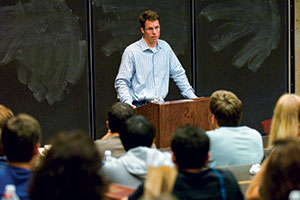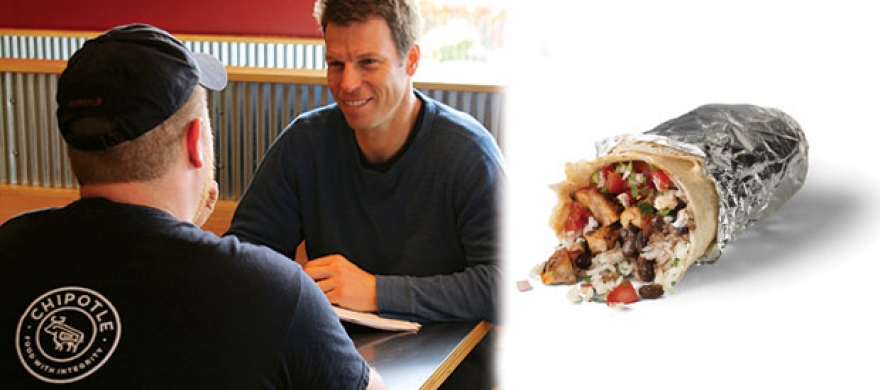A New Kind of Culture
Monty Moran (JD ’93) left law firms behind to pursue a not-so-likely career in the restaurant business.
The dinner invitation came on a whim.
The menu? Burritos. Not at all what Monty Moran expected when he accepted the invitation.
The host? Steve Ells, a culinary school graduate who had been cooking at the famed
Stars restaurant in San Francisco, California, under chef Jeremiah Tower.
“I always looked forward to Steve’s dinner parties,” Moran recalled. “Steve is an
incredible chef, and dinners at his house were always extraordinary. But when he said
we would be having burritos I was initially disappointed. It just sounded boring.
I was wrong. The burrito was awesome!”
Ells asked his guests, including Moran, what they thought of the taste. What he was
doing was getting a feel for the flavor combination—the fresh approach—to a new restaurant
concept he had in mind: a restaurant that would make the burritos he enjoyed in his
off hours in San Francisco, but with his own twist.
The end result? A grand opening in Denver, Colorado, of the first branch of Chipotle
Mexican Grill.
At the time, Moran hadn’t the slightest clue that he had eaten the first of what would
become an internationally recognized burrito. He figured he had enjoyed another evening
with a good friend.
A soon-to-be Pepperdine School of Law graduate, Moran’s focus instead remained on
his legal career, which began in Los Angeles in 1993—the same year Chipotle made its
debut. Three years later Moran and his wife Kathy (JD ’92) made the move to his home
state of Colorado and took an associate position at Messner & Reeves, LLC. The firm,
Moran figured, was a perfect fit. The young attorney’s ambition and leadership skills
made him very attractive to the firm, and eventually led to a partnership and then
his promotion to chief executive officer. Meanwhile, the friendship between Moran
and Ells continued.
“Eventually, Steve asked me if I’d be interested in joining him at Chipotle,” Moran
said. “But I was a litigator. I wasn’t in the restaurant business.”
Despite his success in law, he never closed the conversation with Ells. Instead Moran
agreed to work with Ells to lease properties for Chipotle restaurants. After Chipotle
became a client of Moran’s firm, Ells was also able to utilize his friend’s expertise
as general counsel for his expanding business.
“By 1998 Chipotle was really poised for growth when McDonald’s made an initial investment
in the company. I was happy for Steve, but I wasn’t yet ready to leave my law firm,”
Moran explained.
When Chipotle started thinking about cutting ties with McDonald’s through an initial
public offering, Ells encouraged Moran to join Chipotle full-time, recognizing that
his friend’s strengths would be tremendously beneficial to Chipotle as the company
continued to grow. Monty Moran visited the School of Law in 2007 to speak with students about his career.
Monty Moran visited the School of Law in 2007 to speak with students about his career.
By 2005 Moran decided to take Ells up on his offer to join the Chipotle team. At that
time the company had approximately 10,000 employees and 400 restaurants. Moran left
his position with Messner & Reeves and became Chipotle’s president and chief operating
officer. Among his new duties was to oversee all of the company’s restaurant operations.
“The first time I walked into a Chipotle restaurant I knew there was no way I could
be a general manager,” Moran said. “I didn’t have half the skills that the managers
had. But I had been chosen for my leadership skills. Steve saw how I led my team at
the firm and the kind of culture we built there.
“I believed in building teams of all top performers—people who served the clients
in the best way possible. It wasn’t about billing hours and making partner, it was
about making everyone around you the best they could be, and letting your clients
know that you cared more about their problems than they did. Steve saw how healthy
the culture was at my firm and challenged me to build a similar one at Chipotle.”
So Moran did what most chief operating officers would not do—he signed up for a 10-week
training program to learn everything he could about managing a Chipotle. He figured
his success on the management team was dependent on his ability to understand a day
in the life of every member of the crew.
“No one knew who I was except the manager that was training me,” Moran observed. “I
spent time as a cashier. I learned to cook the food. I rolled burritos. I worked the
tortilla press. I washed dishes. I fully immersed myself as a member of the crew.
And I realized that it was the crew as a whole that was training me. The crew is what
keeps the restaurant going. And the general manager, as their leader, is the most
important member of our team— more important than me or anyone else.”
Moran used his time in the restaurants to learn as much as he could. He spoke with
each crew member to see what they liked and didn’t like about their jobs, and what
their aspirations were.
“I’d talk to the crew in the kitchen, people who were working for hourly wages,” he
said. “I asked them what their goals were; if they thought they’d want to get promoted
eventually. The idea sounded great to them all, but none of them believed it was possible.
I don’t think any of them thought they had a shot at becoming a manager, at someday
either running a Chipotle or taking on a leadership role.”
When his 10 weeks were up, Moran knew what he needed to do. He went to the regional
directors with a new approach. Previous practice included very little promotion within
the company. Moran found that the few restaurants managed by people who had served
as a crew member earlier in their career were not only more successful, but proved
more consistent and had very little turnover. The new Chipotle, Moran announced, was
going to promote all of its managers from within.
“When the field leadership heard me say that the general managers were the most important
members of the team, I think they were taken aback,” Moran remarked. “It wasn’t that
the field leaders weren’t important, but that the best way for them to help the company
was to ensure that we had excellent general managers and crew in all of our restaurants.
Moran began an effort to overhaul the restaurant staffing model—to create a clear
path from crew to manager. He created a new level, “restaurateur,” for the most elite
restaurant managers to reward them for their ability to run great restaurants and,
more importantly for the culture he was building, for developing the people around
them so that they too could become managers.
“What we were doing as a company was establishing a new kind of culture,” Moran said.
“From the beginning, Steve was building a different kind of food culture at Chipotle:
high-quality, raw ingredients; classic cooking techniques; a service model that lets
customers choose exactly what they eat. I knew we needed
a people culture that was just as unique and compelling to help us provide the best
restaurant experience we could, and to develop the future leaders we’d need to support
our growth.”
Moran’s implementation of new programs proved successful. As employee morale began
to grow, so did the level of employee retention.
“My goal is to make sure everyone in the company feels a sense of purpose,” Moran
said. “I want them to have a vision of the restaurant and their role in it.”
Moran’s success with the company led to a promotion to co-chief executive officer
in January 2009. As Chipotle celebrates 20 years in business, Moran can now be found
traveling to many of the company’s 1,500 restaurants to work with managers and the
rest of its 38,000 employees, including at the Chipotle branches in Canada, France,
Germany, and the U.K.
His next step? To help instill a similar culture in the company’s newest restaurant,
ShopHouse, from the beginning. With restaurants now open in Washington, D.C., and
the Los Angeles area, ShopHouse closely follows the Chipotle model but with a menu
of Southeast Asian cuisine.
“This isn’t just a place to come and punch a time clock,” Moran noted. “This is a
place to build a career and be part of a movement that is changing the way people
think about and eat fast food.”
